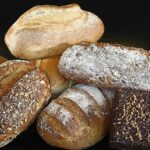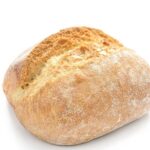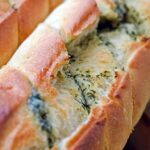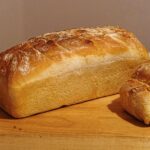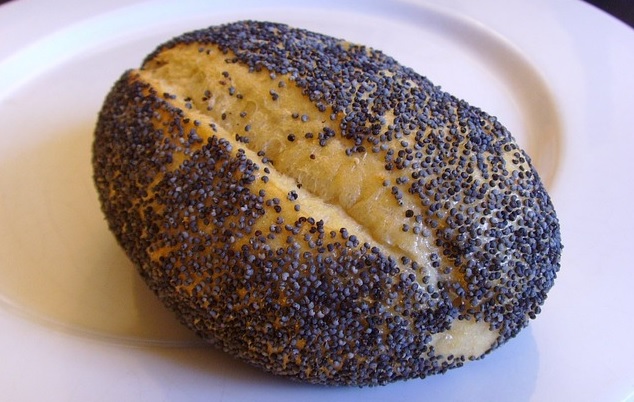
Soft, airy, and crowned with a speckled crunch Mohnbrötchen or German Poppy Seed Rolls are a bakery classic and breakfast must-have across Germany. Whether paired with sweet or savory toppings, these rolls are a textural delight thanks to their crisp crust and pillowy interior.
Baked fresh each morning in bakeries throughout the country, Mohnbrötchen are a flavorful and eye-catching addition to any meal. And with this easy recipe, you can bring them straight to your own table.
The Origins of Mohnbrötchen
Bread rolls – or Brötchen – are essential to German breakfasts, and poppy seed versions have long been a favorite. The poppy seeds not only add crunch but also a gentle nutty flavor and traditional flair.
Popular especially in northern and central Germany, Mohnbrötchen are served with jam, cheese, sausage, or simply buttered and enjoyed with a strong cup of coffee. They’re one of the most recognizable offerings in German bakeries.
Ingredients & Preparation (Step-by-Step Recipe Guide)
Ingredients for Authentic Mohnbrötchen Recipe
- 500 g (4 cups) bread flour
- 1 packet (7 g) dry active yeast
- 10 g (2 tsp) salt
- 1 tsp sugar
- 300 ml (1¼ cups) warm water
- 2 tbsp neutral oil or melted butter
- Poppy seeds for topping
Optional tools: Baking sheet, parchment paper, kitchen scale, spray bottle
How to Make Mohnbrötchen (Step-by-Step Instructions)
Step 1: In a bowl, dissolve yeast and sugar in warm water. Let sit for 10 minutes until bubbly.
Step 2: In a large bowl, mix flour and salt. Add yeast mixture and oil. Knead until the dough is smooth and elastic, about 8–10 minutes.
Step 3: Cover and let rise in a warm spot for 1 to 1.5 hours.
Step 4: Divide dough into 8 equal pieces. Shape into balls or ovals and place on a lined baking tray.
Step 5: Brush each roll with water and dip the tops into poppy seeds. Return to tray, seed-side up.
Step 6: Let rise uncovered for 25–30 minutes. Preheat oven to 220°C (430°F).
Step 7: Score rolls and bake for 18–20 minutes until golden and crusty. Let cool on a rack.
Tips:
- Use freshly toasted poppy seeds for maximum flavor.
- Spray rolls with water just before baking for a better crust.
- Store in a cloth bag for freshness or freeze in batches.
Serving Suggestions & Variations
How to Serve Mohnbrötchen
Serve with butter and jam, cheese and tomato, or deli meats. They’re perfect for breakfast platters, picnics, or snack trays.
Variations & Regional Twists
- Sesambrötchen: Use sesame seeds instead.
- Körnerbrötchen: Try a mix of pumpkin, flax, and sunflower seeds.
- Mini Rolls: Shape into bite-sized buns for buffets or kids’ lunches.
Explore more German classics with Kartoffelbrot – Potato Bread or Dinkelbrot – Spelt Bread.
Mohnbrötchen are proof that something simple can be deeply satisfying. Whether homemade or bakery-fresh, their soft interior and crunchy top are a treat worth savoring any time of day.
Discover more classic loaves and traditional favorites on our German Bread Recipes page – your guide to rustic, regional, and everyday German baking.
Related Recipes:
Bauernbrot (Farmer’s Bread) Recipe – A rustic sourdough loaf made from rye and wheat, Bauernbrot is a German staple known for its hearty crust and tangy flavor.
Pumpernickel Recipe – Originating from Westphalia, this dense, dark rye bread is slow-baked for hours, developing its signature malty sweetness.
Vollkornbrot (Whole Grain Bread) Recipe – Packed with whole grains and seeds, this high-fiber loaf is favored for its nutty flavor and nutritional benefits.
Roggenbrot (Rye Bread) Recipe – A classic in German bakeries, Roggenbrot is typically sourdough-based and rich in earthy rye flavor.
Brötchen (Bread Rolls) Recipe – Crisp on the outside and soft within, Brötchen are the go-to breakfast rolls found on every German table.
Pretzels (Brezn) Recipe – Twisted and golden-brown, these iconic Bavarian soft pretzels are finished with salt and loved across the globe.
Schwarzbrot (Black Bread) Recipe – Made from coarse rye and sourdough starter, this dense loaf is especially popular in northern Germany.
Dinkelbrot (Spelt Bread) Recipe – Spelt-based with a light, nutty flavor, Dinkelbrot is an ancient-grain alternative enjoyed for its digestibility.


